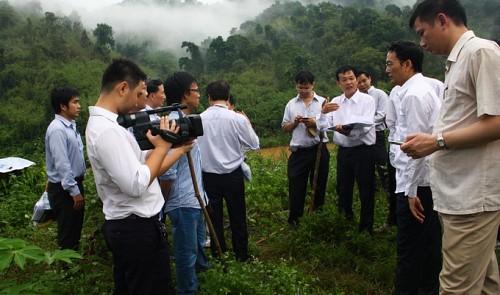The Ministry of Natural Resource and Environment has sent a report to the Prime Minister affirming that the Dong Nai hydropower project, a controversial issue over the past several years, will have an adverse impact on the environment.
>> Province asks PM to stop hydropower projects>> Dong Nai hydro projects should be stopped: UNESCO >> Dong Nai authorities say ‘No’ to hydropower projects>> Dong Nai hydro projects should be suspended: expert
In a recent question-answer session of the National Assembly, Industry and Trade Minister Vu Huy Hoang said that if the Dong Nai 6 and 6A plants planned to be built on the Dong Nai River will significantly affect the environment, the ministry will decisively not allow the project to be developed. According to the environmental impact assessment (EIA) report, revised for the third time in June by the investor, Duc Long Gia Lai Group Joint Stock Company, the project will generate 929 million kWh and pay VND300 million in taxes to the State budget every year. However, this project will also have a harmful impact on the environment, as it will cause the permanent loss of 372 hectares of forest, including 182 hectares belonging to Cat Tien National Park. The EIA said hydropower plant 6A will not affect the Bau Sau (Crocodile Lake) Ramsar site in the Park, but has yet to provide specific data on the seasonal currents from the Dong Nai River to the wetland. The EIA has yet to provide a sufficient assessment of the loss of biological diversity in the wetland and fails to set out measures to protect a rare precious fish species: Anguilla marmorata. The project will also impact the river’s flow in its downstream areas and the demand for water use in the area. The ministry also said that as the project is developed, many subsidiary structures will also be built, such as the power transmission network and road system. These sub-works will have further adverse impacts on the natural, social and economic environment and infringe upon Cat Tien. “The development of these projects will also be detrimental to UNESCO’s recognition of the Park as a World Natural Heritage site,” the ministry said, adding that the project violates the Law on Cultural Heritage. On September 10, Truong Van Vo, deputy head of the NA delegation from Dong Nai, said he had received the ministry’s report, which he said is a good move in compliance with laws related to hydro power projects. “The Ministry of Natural Resources and Environment has reported to the Prime Minister that the hydropower project will have many adverse impacts on the environment. Therefore, the Ministry of Industry and Trade must cancel the two projects,” Vo said.Opposition The project has also faced objections from Dong Nai province authorities as well as many researchers, scientists and environmental organizations over the past several years. Vo said, “The NA delegation of Dong Nai has repeatedly raised the question at NA meetings of the legal foundation on which the project is based. This project has violated many laws. On the other hand, it has yet to be presented to the NA for decision, as required by Resolution 49/2010/QH12.” In November 2012, the National Committee for the Man and Biosphere Program (MAB) in Vietnam, under UNESCO, proposed that the country stop two hydropower projects in Dong Nai Province; otherwise, it would go against its international commitments, said provincial authorities. At a seminar titled “The Dong Nai River Basin: Impacts of the Hydropower Projects” held in Ho Chi Minh City on December 16, 2012, experts warned that the hydropower projects should not be approved as they would violate laws and damage the environment. “It is not advisable to build these two plants, as they may have a great impact on the entire region’s natural and social environment, causing immeasurable and irreversible consequences.” said Dr. Le Anh Tuan, from the Climate Change Research Institute of Can Tho University. The projects also violate the Law on Biological Diversity, under which, except for works built for the sake of defense and security, all construction projects are banned from strictly protected areas in conservation zones like Cat Tien, he said. In addition, he said, the projects are against the National Assembly’s Resolution 49, under which projects or works using land which belongs to national parks, conservation areas, or forests for research purposes must get National Assembly approval if the area in question is larger than 50 hectares. In a proposal sent to the prime minister and the NA’s Committee for Science, Technology and Environment on May 15 , deputy chairman of the provincial People’s Committee Nguyen Thanh Tri requested that the project be stopped. The two planned plants will directly affect the Bau Sau wetland in Cat Tien, cause flooding during the rainy season and water shortages in the dry season in downstream areas, undermine and cause a loss of habitat for many rare and precious species of flora and fauna, including those at risk of extinction, bury the Cat Tien cultural relics, and affect the culture and life of local ethnic minorities. If built, the two projects will violate not only Vietnam’s applicable laws, but also related international conventions to which Vietnam is a party, the proposal said.
In talking with Tuoi Tre about the project on September 10, Professor Nguyen Ngoc Long, head of the Sustainable Forest Management Institute, said, “Given its scale, the project must be subject to approval of the National Assembly.”





















































